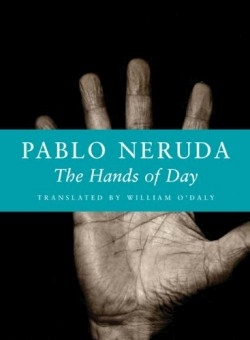The Hands of Day
If we believe the ancient Greeks, the poet is a maker, “poet” being derived from the Greek poiesis: making. In The Hands of Day, beloved Chilean poet and Nobel Laureate Pablo Neruda crafts his love song to the human hands that transform the physical world to create roads, tools, and other useful things to support life. He also reconciles himself with his destiny and work as a poet. He begins with a guilty lament that he has not used his hands well: “Why did I not make a broom? / Why was I given hands at all?” He moves toward linking the work of the manual laborer with the work of the poet. Along the way, his radiant and unadorned images remind us of the beauty of the world—the “gutteral crystal” of birdsong—and of human endeavor.
“Who am I, if I created nothing?” he asks, reminding us of our generative powers. Again and again Neruda charts the distance between himself and those who make things with their hands: “To build was the destiny of hands / and every scar holds life within it.” In contrast, he is nothing, one who traffics in absence and is reduced to a shadow, who “only really lived in farewells.” Poem by poem he catalogues and honors the work of which he has not been a part: farming, the making of metals, of roads and railroads. He thinks himself “one worthless servant, / like a mollusk cracked / by the teeth of the sea,” and as alien as a “child of the moon,” for the world belongs to those who contributed to its making.
Finally he acknowledges that things begin with words and names, and, at last, how he uses his hands to craft his work: “one must knead / the mud / until it sings.”
This is the first publication in English of Las manos del dia, originally published in Spanish in 1968, and the latest in a series of Neruda works translated for Copper Canyon Press by William O’Daly. This project was supported in part by a grant from the National Endowment for the Arts.
Gorgeous, essential, humble and discerning, this book reminds us of the unity of all of creation and of the human’s and the poet’s place in it. How fortunate that Neruda used his hands to craft poems that illuminate and sustain life.
Reviewed by
Teresa Scollon
Disclosure: This article is not an endorsement, but a review. The publisher of this book provided free copies of the book to have their book reviewed by a professional reviewer. No fee was paid by the publisher for this review. Foreword Reviews only recommends books that we love. Foreword Magazine, Inc. is disclosing this in accordance with the Federal Trade Commission’s 16 CFR, Part 255.

